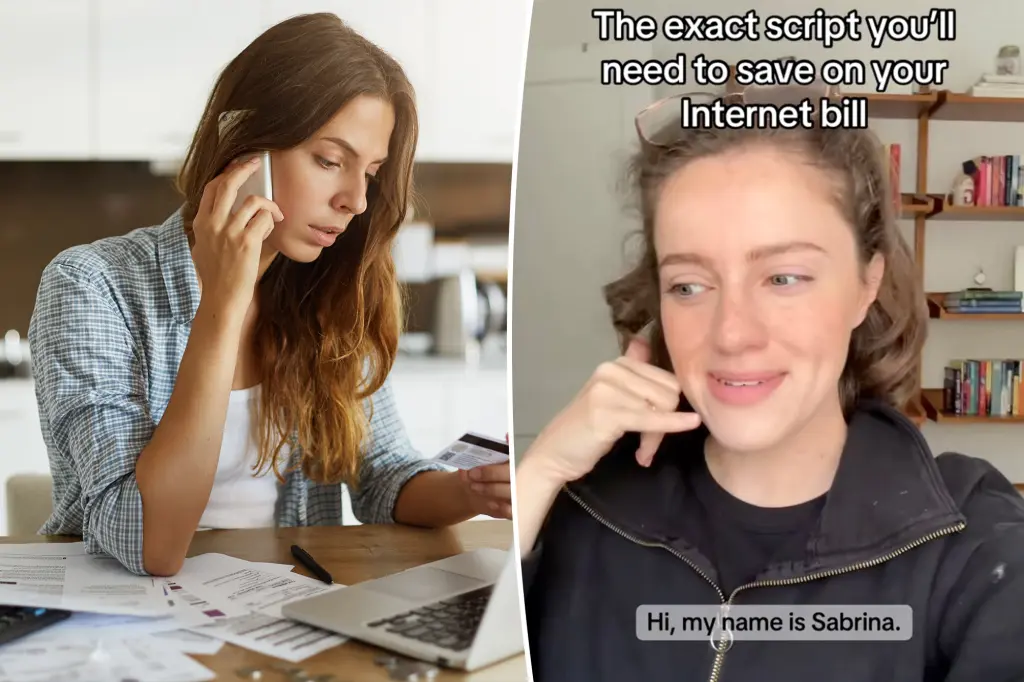Smart Money-Saving Strategies: How to Reduce Your Internet Bill and Beyond
In today’s challenging economic climate, finding ways to save money has become a priority for many. From negotiating bills to adopting smart spending habits, people are increasingly seeking practical advice to stretch their dollars further. One woman’s viral TikTok video offers a simple but effective strategy for reducing monthly internet costs, sparking a conversation about various money-saving techniques that anyone can implement.
Sabrina, a content creator specializing in financial tips, recently shared her foolproof method for lowering internet bills on TikTok, garnering nearly 62,000 views. Her approach centers around following a specific script when calling customer service representatives. She advises customers to begin by stating they’ve noticed a bill increase that they simply cannot afford. The key line in her script is direct but effective: “If I can’t get it down to the rate that it was last month, I’m going to have to cancel. Is this something you can help me with?” This straightforward approach often prompts customer service agents to offer promotional rates or discounts to retain the customer. Even if the first representative isn’t helpful, Sabrina recommends persistence—reiterating that you’ll need to cancel if they can’t provide a more affordable rate, which usually results in being transferred to someone who can help. Sabrina reports a “100% success rate” using this method, suggesting it’s worth trying for anyone looking to reduce their monthly expenses.
The comment section on Sabrina’s video became a treasure trove of additional money-saving wisdom from experienced negotiators. Many viewers shared their own successful strategies, highlighting the importance of persistence and sometimes creativity when dealing with service providers. One commenter suggested not being afraid to end a call and try again with a different agent if the first one isn’t accommodating. Another described how they leveraged competition by telling their current provider (Optimum) that they were planning to switch to Verizon for a better rate. After initially refusing to help, the provider eventually offered a $20 monthly discount plus two months of free service. Several commenters noted that while these negotiations often work well, the downside is having to repeat the process annually when promotional rates expire. One particularly savvy negotiator recommended asking for bill credits in addition to rate reductions if the representative seems especially eager to retain your business, sharing a success story of securing a $250 credit during one such conversation.
Beyond bill negotiations, younger generations are embracing older financial wisdom to control their spending habits. Generation Z, often characterized as digital natives who rarely use cash, has paradoxically begun adopting cash-only budgeting techniques to limit impulse purchases and maintain better awareness of their spending. Financial planner Nadia Vanderhall describes a popular weekend budgeting strategy where individuals withdraw a predetermined amount of cash on Friday to cover all weekend expenses through Sunday. This tangible approach to money management creates a physical limit on spending that digital payments often fail to provide. As Vanderhall explains, this method is particularly effective for those who “swipe without thinking or tend to overspend on food, convenience, or random little things,” as it creates a heightened awareness of each purchase and forces mindful spending decisions.
The resurgence of cash budgeting techniques represents a fascinating countertrend in our increasingly cashless society. While digital payment methods offer convenience, they can disconnect consumers from the psychological impact of spending, making it easier to exceed budgets without realizing it. By physically handling cash and watching it diminish with each purchase, people become more conscious of their spending patterns and may naturally become more selective about purchases. This approach aligns with behavioral economics research suggesting that we experience more “pain” when paying with cash than with cards or digital methods, which can serve as a natural deterrent to unnecessary spending. The weekend cash budget method also introduces a helpful temporal boundary to spending, creating a clear framework for financial discipline within a manageable timeframe.
These various money-saving approaches—from negotiating service bills to embracing cash-only budgeting—share a common theme of proactive financial management. Rather than passively accepting rising costs or continuing problematic spending patterns, savvy consumers are taking control through deliberate strategies and clear boundaries. The popularity of Sabrina’s video and the enthusiastic response from viewers suggest a widespread desire for practical financial advice that yields immediate results. While economic pressures continue to challenge many households, these simple techniques demonstrate that individuals still have significant power to influence their financial situations through informed choices and strategic actions. Whether by making a confident phone call to service providers or withdrawing cash for weekend expenses, these small behaviors can collectively lead to significant savings over time, helping people navigate financial challenges while building more sustainable spending habits.














